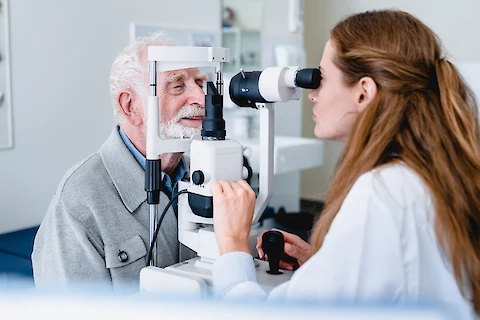
Eye exams are essential to ensure you can see clearly. But it's also vital to facilitate regular monitoring of your eye health. Getting an eye exam is necessary to identify eye diseases in the early stages, where treatment to prevent vision loss is the most effective.
Seniors are at a higher risk for vision problems like cataracts, glaucoma, macular degeneration, and other issues. For this reason, getting routine eye exams should be a priority to promote the best preventive eye care practices. But how often should seniors in their 70s and 80s get an exam? Read on to learn more.
Preventive Eye Care: The Best Time to Get an Exam
Eye exam recommendations change as you age. Those between the ages of 20 and 39 years with 20/20 vision are encouraged to get an eye exam every five years. Ages 40 to 54 should get an eye exam every two to four years.
Individuals between the ages of 55 to 64 should receive an eye exam every one to three years. But individuals 65+ should see their ophthalmologist for an eye exam every one to two years as the risk for age-related vision problems increases.
What Does an Ophthalmologist Check For?
Seeing your ophthalmologist for an eye exam every year or every other year is vital to preventive eye care. During your exam, the ophthalmologist will check for several age-related eye conditions, including:
- Age-related macular degeneration: AMD is an eye disease that can blur central vision. It typically occurs when there is damage to the macula due to aging. The macula is part of the retina and the aspect of the eye that controls sharp, central (straight-ahead) vision.
- Diabetic retinopathy: This is a diabetes complication that affects the eyes. It causes damage to the blood vessels of the retina. Seniors with diabetic retinopathy may not present any symptoms at first or may experience mild vision problems. But failing to treat diabetic retinopathy can lead to total blindness.
- Glaucoma: One common eye disease in older adults is glaucoma. Glaucoma refers to a group of eye conditions that can cause blindness due to damaging the optic nerve. The optic nerve is vital because it sends visual information from your eye to the brain. Optic nerve damage is often due to high pressure in the eye. However, glaucoma can still occur even when eye pressure is normal.
- Cataracts: Cataracts are another common condition that affects more than half of all Americans age 80 or older. A cataract is a cloudy area in the lens of your eye. It can go unnoticed for a while but can begin to blur your vision, cause hazy vision, or make your vision less colorful.
Personalized In-Home Care with Senior Helpers St. Louis
At Senior Helpers St. Louis, we provide personalized in-home care for older adults in St. Louis, Ballwin, Fenton, and Arnold. We are proud to offer a comprehensive suite of programs and services that support aging and place. Contact us today to learn more.